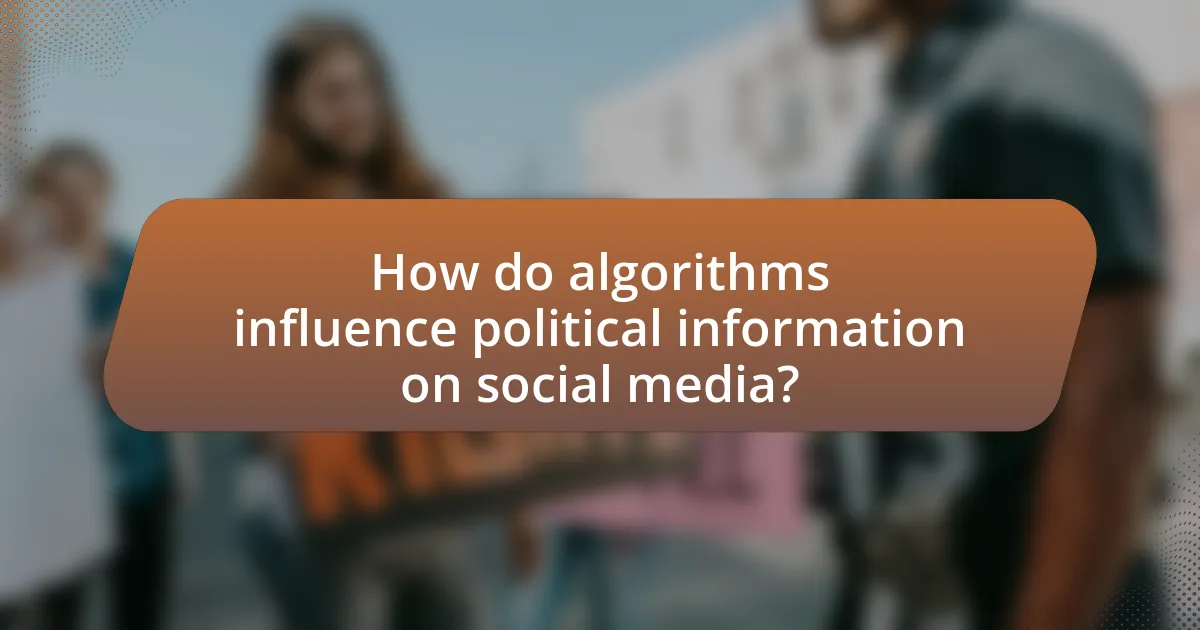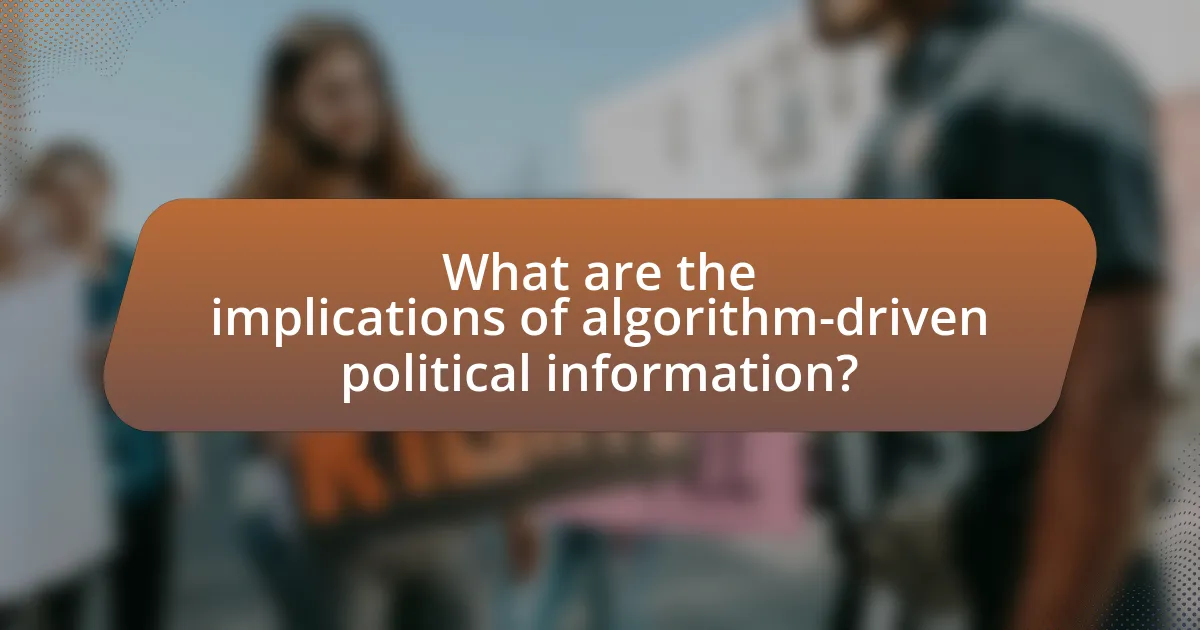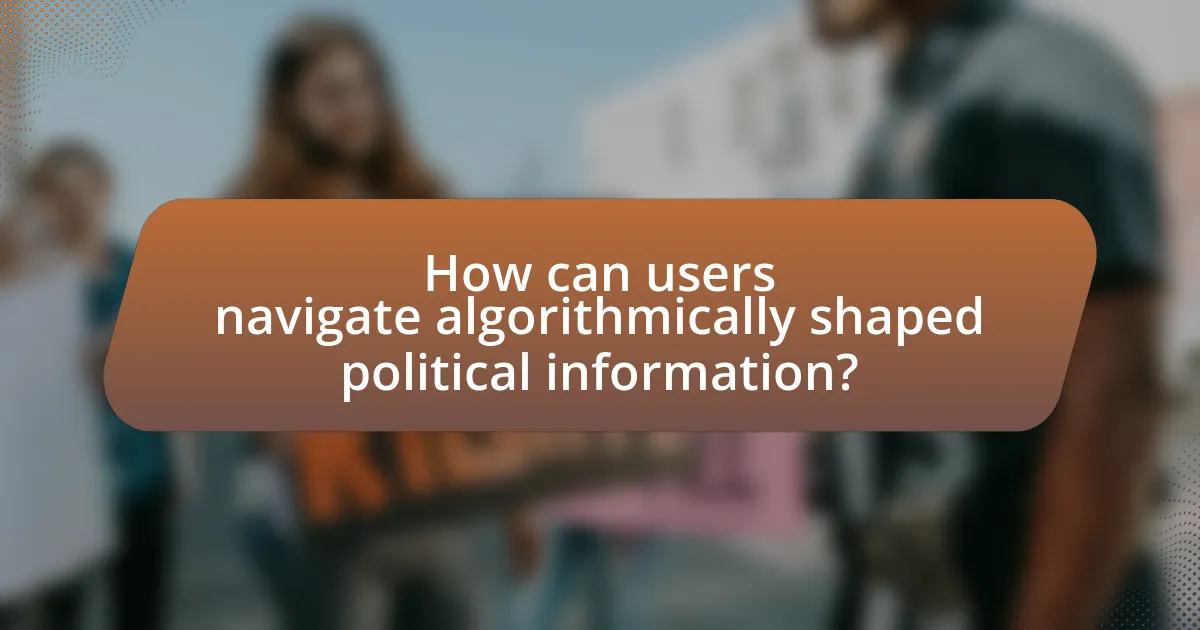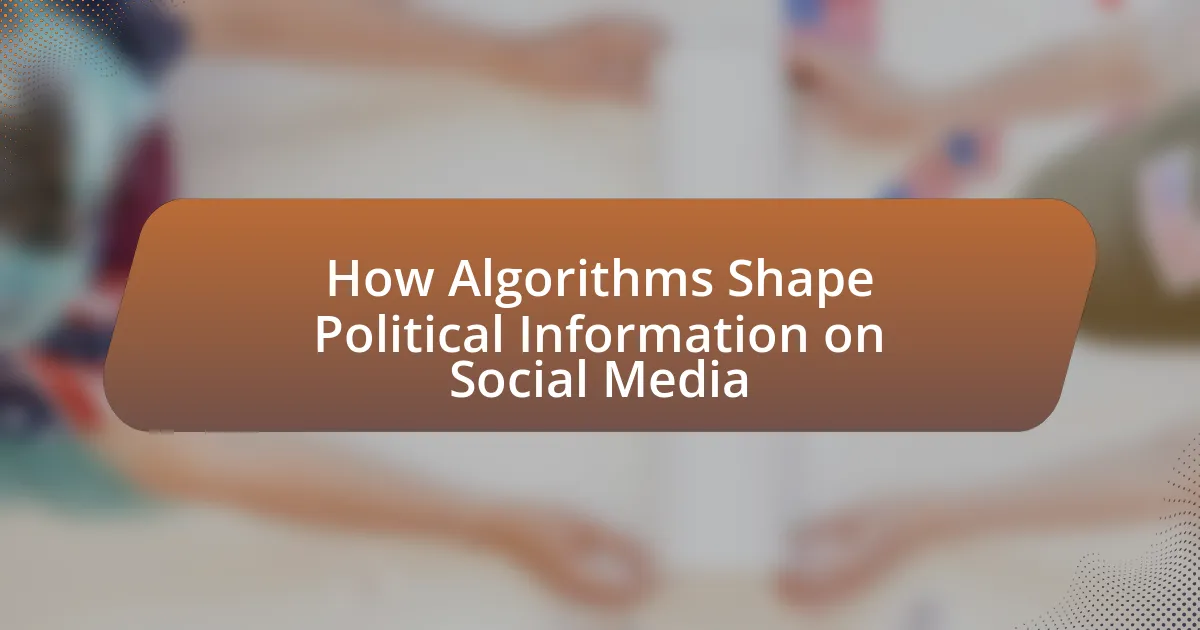Algorithms play a critical role in shaping political information on social media by determining the visibility and reach of content based on user engagement metrics. They prioritize posts that generate likes, shares, and comments, often amplifying sensational or polarizing content, which can lead to echo chambers and limit exposure to diverse viewpoints. This selective exposure influences public perception, voter behavior, and political polarization, raising ethical concerns regarding misinformation and bias. Understanding these algorithmic influences is essential for navigating political discourse and fostering informed engagement in democratic processes.

How do algorithms influence political information on social media?
Algorithms significantly influence political information on social media by determining the visibility and reach of content based on user engagement metrics. These algorithms prioritize posts that generate likes, shares, and comments, often amplifying sensational or polarizing content, which can skew public perception and discourse. For instance, a study by the Pew Research Center found that algorithms can create echo chambers, where users are predominantly exposed to viewpoints that align with their own, thereby reinforcing existing beliefs and reducing exposure to diverse perspectives. This selective exposure can shape political opinions and behaviors, impacting electoral outcomes and public policy discussions.
What role do algorithms play in shaping user experiences on social media platforms?
Algorithms play a crucial role in shaping user experiences on social media platforms by determining the content that users see based on their preferences and behaviors. These algorithms analyze user interactions, such as likes, shares, and comments, to curate personalized feeds that aim to maximize engagement. For instance, Facebook’s algorithm prioritizes posts that generate higher user interaction, which can lead to echo chambers where users are predominantly exposed to content that aligns with their existing beliefs. Research by the Pew Research Center indicates that 64% of Americans believe social media has a mostly negative effect on the way things are going in the country today, highlighting concerns about the impact of algorithm-driven content on public discourse.
How do algorithms determine what content is shown to users?
Algorithms determine what content is shown to users by analyzing user behavior, preferences, and engagement metrics. These algorithms utilize data such as past interactions, likes, shares, and comments to create a profile of user interests, which informs content recommendations. For instance, platforms like Facebook and Twitter employ machine learning techniques to optimize the relevance of posts in users’ feeds, ensuring that content aligns with individual preferences. Research indicates that algorithms can significantly influence political information exposure, as they prioritize content that generates higher engagement, potentially leading to echo chambers or biased information consumption.
What factors influence algorithmic decisions regarding political content?
Algorithmic decisions regarding political content are influenced by user engagement metrics, content relevance, and platform policies. User engagement metrics, such as likes, shares, and comments, determine the visibility of political content, as algorithms prioritize posts that generate higher interaction. Content relevance is assessed through natural language processing techniques that analyze the sentiment and context of posts, ensuring that users receive information aligned with their interests and beliefs. Additionally, platform policies, which may include guidelines on misinformation and hate speech, shape the algorithm’s filtering process, affecting what political content is promoted or suppressed. These factors collectively dictate the flow of political information on social media platforms.
Why is understanding algorithms important for political discourse?
Understanding algorithms is crucial for political discourse because they determine how information is disseminated and consumed on social media platforms. Algorithms curate content based on user engagement, which can amplify certain political messages while suppressing others, thereby shaping public opinion and influencing democratic processes. For instance, research by the Pew Research Center indicates that 64% of Americans believe social media has a significant impact on their political views, highlighting the role of algorithms in shaping political narratives.
How do algorithms affect the diversity of political opinions presented to users?
Algorithms significantly limit the diversity of political opinions presented to users by prioritizing content that aligns with their previous interactions and preferences. This personalization often leads to echo chambers, where users are predominantly exposed to viewpoints similar to their own, reducing the likelihood of encountering opposing perspectives. Research by the Pew Research Center indicates that social media algorithms can create filter bubbles, which restrict the range of information users receive, thereby influencing their political beliefs and attitudes.
What impact do algorithms have on the spread of misinformation in politics?
Algorithms significantly amplify the spread of misinformation in politics by prioritizing engagement over accuracy. Social media platforms utilize algorithms that favor sensational content, which often includes misleading or false information, as it generates more clicks, shares, and comments. A study by the Massachusetts Institute of Technology found that false news stories are 70% more likely to be retweeted than true stories, highlighting how algorithmic design can lead to the rapid dissemination of misinformation. This prioritization creates echo chambers where users are exposed predominantly to content that aligns with their existing beliefs, further entrenching misinformation within political discourse.

What are the implications of algorithm-driven political information?
Algorithm-driven political information can lead to significant implications such as the polarization of public opinion and the spread of misinformation. Algorithms prioritize content based on user engagement, often amplifying extreme viewpoints and creating echo chambers where users are exposed primarily to information that reinforces their existing beliefs. Research by the Pew Research Center indicates that social media users are more likely to encounter politically biased content, which can distort perceptions of political reality and contribute to societal division. Furthermore, algorithmic biases can result in the dissemination of false information, as sensational or misleading content often garners more attention than factual reporting, undermining informed democratic discourse.
How do algorithms contribute to echo chambers in political discussions?
Algorithms contribute to echo chambers in political discussions by prioritizing content that aligns with users’ existing beliefs and preferences. Social media platforms utilize algorithms to analyze user behavior, such as likes, shares, and comments, which leads to the amplification of similar viewpoints while filtering out opposing perspectives. This selective exposure reinforces users’ pre-existing opinions and creates a feedback loop, as evidenced by research from the Pew Research Center, which found that individuals who engage with politically homogeneous content are more likely to become entrenched in their views. Consequently, algorithms play a crucial role in shaping the political discourse by limiting the diversity of information that users encounter.
What evidence exists to support the existence of echo chambers on social media?
Evidence supporting the existence of echo chambers on social media includes studies demonstrating that users are more likely to engage with content that aligns with their pre-existing beliefs. Research by Bakshy et al. (2015) published in “Proceedings of the National Academy of Sciences” found that Facebook users are exposed to a limited range of viewpoints due to algorithmic filtering, which prioritizes content similar to what users have previously engaged with. Additionally, a study by Barberá (2015) in “Political Communication” showed that Twitter users often interact within ideologically homogeneous networks, reinforcing their political views and limiting exposure to opposing perspectives. These findings indicate that social media algorithms contribute to the formation of echo chambers by curating content that aligns with users’ beliefs, thereby isolating them from diverse viewpoints.
How do echo chambers affect voter behavior and political polarization?
Echo chambers significantly influence voter behavior and contribute to political polarization by reinforcing existing beliefs and limiting exposure to diverse viewpoints. Individuals within echo chambers are more likely to engage with information that aligns with their pre-existing opinions, which can lead to increased certainty in their political beliefs. Research indicates that social media algorithms often prioritize content that resonates with users’ preferences, thereby creating a feedback loop that amplifies partisan perspectives. For instance, a study by the Pew Research Center found that users who primarily consume news from like-minded sources are more likely to develop extreme political views, further entrenching divisions within the electorate. This phenomenon not only affects individual voter decisions but also exacerbates societal polarization, as groups become more isolated in their ideological stances.
What ethical considerations arise from algorithmic influence on political information?
Algorithmic influence on political information raises significant ethical considerations, primarily concerning bias, misinformation, and manipulation. Algorithms can perpetuate existing biases by favoring certain political viewpoints over others, leading to a skewed representation of political discourse. For instance, research by the Pew Research Center indicates that social media algorithms often prioritize content that aligns with users’ pre-existing beliefs, creating echo chambers that limit exposure to diverse perspectives.
Additionally, the spread of misinformation is exacerbated by algorithms that prioritize engagement over accuracy, allowing false narratives to gain traction. A study published in the journal Science found that false news stories are 70% more likely to be retweeted than true stories, highlighting the ethical dilemma of prioritizing sensationalism over factual reporting.
Moreover, the potential for manipulation raises concerns about the integrity of democratic processes. Algorithms can be exploited to target specific demographics with tailored political ads, as seen in the Cambridge Analytica scandal, where personal data was used to influence voter behavior in the 2016 U.S. presidential election. This manipulation undermines informed decision-making, a cornerstone of democratic engagement.
In summary, the ethical considerations surrounding algorithmic influence on political information include bias, misinformation, and manipulation, all of which pose risks to the integrity of political discourse and democratic processes.
How do biases in algorithms affect political representation?
Biases in algorithms significantly affect political representation by skewing the visibility of political content and influencing public opinion. For instance, algorithms that prioritize sensational or polarizing content can amplify extreme viewpoints while marginalizing moderate perspectives, leading to a distorted representation of political discourse. Research by the Pew Research Center indicates that social media algorithms often favor content that generates high engagement, which can result in echo chambers that reinforce existing biases and limit exposure to diverse political opinions. This selective exposure can ultimately shape voter perceptions and behaviors, undermining the democratic process by creating an unbalanced political landscape.
What responsibilities do social media companies have regarding algorithm transparency?
Social media companies have the responsibility to disclose the workings of their algorithms to ensure transparency and accountability. This includes providing clear information on how algorithms prioritize content, the criteria used for recommendations, and the potential impacts on user behavior and public discourse. For instance, the European Union’s Digital Services Act mandates that platforms must explain their algorithmic processes, particularly regarding content moderation and advertising, to mitigate misinformation and enhance user understanding. Such regulations aim to foster trust and enable users to make informed decisions about the information they consume.

How can users navigate algorithmically shaped political information?
Users can navigate algorithmically shaped political information by critically assessing the sources and content of the information they encounter. This involves verifying the credibility of the platforms, cross-referencing information with reputable news outlets, and being aware of the algorithms that curate their feeds, which often prioritize engagement over accuracy. Research indicates that algorithms can create echo chambers, reinforcing existing beliefs and limiting exposure to diverse viewpoints. For instance, a study by the Pew Research Center found that social media users often receive news that aligns with their political preferences, which can skew their understanding of political issues. By actively seeking out varied perspectives and utilizing fact-checking resources, users can mitigate the effects of algorithmic bias and make more informed decisions regarding political information.
What strategies can users employ to diversify their political information sources?
Users can diversify their political information sources by actively seeking out a variety of media outlets, including those with differing political perspectives. This can be achieved by subscribing to news platforms that represent a range of ideologies, such as conservative, liberal, and independent sources. Research indicates that exposure to diverse viewpoints can enhance critical thinking and reduce confirmation bias, as shown in studies by the Pew Research Center, which found that individuals who engage with multiple news sources are more informed about political issues. Additionally, users can follow political commentators and analysts on social media who offer varied perspectives, participate in discussions in online forums that encourage diverse opinions, and utilize news aggregation apps that curate content from a wide array of sources. By implementing these strategies, users can create a more balanced understanding of political issues and counteract the effects of algorithm-driven echo chambers on social media.
How can users identify and mitigate the effects of algorithmic bias?
Users can identify and mitigate the effects of algorithmic bias by actively analyzing the outputs of algorithms and employing strategies to counteract biased influences. To identify bias, users should examine the diversity of sources and perspectives presented by algorithms, noting any patterns that favor specific viewpoints or demographics. For mitigation, users can adjust their settings to diversify their content exposure, engage with a broader range of sources, and utilize tools designed to highlight algorithmic transparency. Research indicates that algorithmic bias can lead to skewed political information, as seen in studies like “Algorithmic Bias Detectable in Social Media” by Barocas and Selbst, which emphasizes the importance of user awareness and proactive engagement in addressing these biases.
What tools are available to help users understand their social media algorithms?
Tools available to help users understand their social media algorithms include algorithm transparency reports, social media analytics platforms, and browser extensions designed for algorithm analysis. Algorithm transparency reports, provided by platforms like Facebook and Twitter, outline how content is prioritized and the factors influencing visibility. Social media analytics platforms, such as Hootsuite and Sprout Social, offer insights into engagement metrics and audience behavior, helping users interpret algorithmic impacts on their content. Additionally, browser extensions like “News Feed Eradicator” for Facebook allow users to customize their feeds and observe changes in content delivery, enhancing their understanding of algorithmic functions. These tools collectively empower users to navigate and comprehend the complexities of social media algorithms effectively.
What best practices should users follow to engage with political content on social media?
Users should verify the credibility of sources before engaging with political content on social media. Engaging with verified information helps prevent the spread of misinformation, which is prevalent on these platforms. According to a study by the Pew Research Center, 64% of Americans believe that misinformation is a major problem in political discourse online. Additionally, users should critically evaluate the context of the content, as algorithms often prioritize sensationalized posts, which can distort the actual message. Engaging in respectful discussions and considering multiple viewpoints can also enhance understanding and reduce polarization, as research indicates that exposure to diverse perspectives can foster more informed opinions.
How can critical thinking enhance user engagement with political information?
Critical thinking enhances user engagement with political information by enabling individuals to analyze, evaluate, and synthesize diverse viewpoints critically. This analytical approach fosters deeper understanding and encourages users to question biases and misinformation prevalent in social media algorithms, which often prioritize sensational content over factual accuracy. Research indicates that users who apply critical thinking skills are more likely to engage with political content thoughtfully, leading to informed discussions and a more active participation in democratic processes. For instance, a study published in the Journal of Communication found that individuals who practiced critical thinking were better at discerning credible sources, resulting in higher engagement levels with political discourse.
What role does media literacy play in understanding algorithmic influences?
Media literacy plays a crucial role in understanding algorithmic influences by equipping individuals with the skills to critically analyze and evaluate the information presented to them through digital platforms. This understanding enables users to recognize how algorithms curate content based on their preferences, which can shape their perceptions and beliefs, particularly in the context of political information. Research indicates that individuals with higher media literacy are better able to discern biased or misleading information, as they can identify the underlying mechanisms of algorithmic filtering and personalization. For instance, a study by the Pew Research Center found that media literacy education significantly enhances users’ ability to detect misinformation and understand the implications of algorithm-driven content, thereby fostering informed engagement with political discourse on social media.
